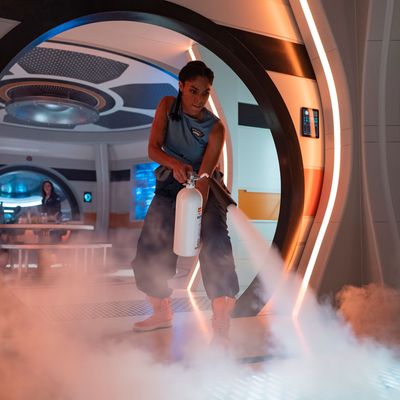
CBS All Access’ revived Twilight Zone has, thus far, stayed pretty close to patterns established by its classic predecessor, offering morality tales wrapped in science fiction and fantasy trappings and tied together with a twisty little bow at the end. Sometimes it’s worked. Sometimes it hasn’t. But nothing has strayed too far outside some preexisting boundaries. The latest entry, “Six Degrees of Freedom,” comes closest until a final twist confirms we’re still very much in Twilight Zone territory. What had seemed like a pure psychodrama set on a long, arduous space voyage turns out to have been telling a different sort of story all along. It’s a neat trick, and if the episode itself feels a bit uneven — thanks largely again to an extended running time of the sort that’s troubled the series from the start — it’s still one of the stronger entries the series has yet produced.
It’s also an episode that looks destined to zig but chooses instead to zag. Set entirely on a spaceship destined for Mars, it opens with an excited crew getting ready for takeoff, blasting a favorite song (“Family,” by the ska band The Interrupters), and preparing to push off into the great unknown. Then, moments before launch, they receive some awful news: nuclear missiles launched from North Korea are headed their way and things don’t look so hot for life on Earth in general. They face a difficult choice: head to Mars anyway or stay and suffer the same fate as everybody else.
It would be a short episode if they stayed, of course, but it’s en route to Mars that the real drama begins, as the crew of five contemplates what they’ve lost as they head to a new planet that itself offers little beyond certain death. Flight Commander Alexa Brant (DeWanda Wise) does her best to keep everyone focused, but it’s a tough job. Engineer Ray Tanaka (Jessica Williams) can’t stop calling home and listening to her family’s answering machine. When she takes up with Pilot Casey Donlan (Jonathan Whitesell), the crew is presented with a different sort of problem, as an unplanned pregnancy would cut into their carefully measured supplies. Flight Surgeon Katherine Langford (Lucinda Dryzek) mostly suffers in silence while Mission Specialist Jerry Pierson (Jefferson White) grows increasingly philosophical, and possibly unhinged, eventually suggesting that what they’re experiencing isn’t real at all.
It feels real, however, and there’s no faking the emotions the experience is putting them through — the performances, the claustrophobic direction of Jakob Verbruggen (Black Mirror, The Alienist), and the script by Heather Anne Campbell and Glenn Morgan combine to make this an especially tense outing. But, unlike its characters, it only seems to be headed toward an obvious destination.
It’s easy to expect “Six Degrees of Freedom” to depict its characters breaking down and turning on one another, but the episode has other plans. Brant’s strict command stirs resentment and everyone threatens to crack under the stressful conditions, but the moment they all turn on each other, thus dooming the mission and confirming the worst about humanity, never arrives. Even Pierson’s meltdown comes as the result of scientific inquiry and an attempt to reason his way to a happy ending. Maybe, even under the most intense pressure imaginable and while suffering indescribable loss, people aren’t so bad after all. One character tells another, “I’ll help you if you help me.” And maybe, at least in this lonely stretch of space, that’s all it takes.
It’s enough, at least, to impress the aliens watching their progress, creatures that deem them worthy of salvation in this installment’s final moments, moments that serve as a reminder that, oh yeah, we’re watching an episode of The Twilight Zone. And even if the twist itself isn’t blazingly original — it’s essentially a reversal of the end of “The Monsters Are Due on Maple Street” — it feels right as the culmination of all that’s preceded it in an episode that works overtime not to give into misanthropy, even in the shadow of armageddon.
Light and Shadows
• It’s fun to play spot-the-reference with this episode. The sweaty, maddening space voyage owes a lot to Alien, Sunshine, and either version of Solaris. That Jefferson White starts to look more and more like Jeremy Davies in Steven Soderbergh’s remake as the episode progresses makes Solaris feel especially relevant, even without Pierson’s hallucinations (or whatever they are). Pierson also gets some moments on loan from 2001: A Space Odyssey in the final seconds.
• Pierson’s “we’re being tested” theory also plays like a callback to “Where is Everybody?,” the first episode of the original series’ first season. Another callback: Langford fiddles with a toy plane bearing the Northern Goldstar logo, the same airline Adam Scott’s doomed character flies in “Nightmare at 30,000 Feet.” That also explains the flight to Mars poster on view in that episode. In “Nightmare at 20,000 Feet,” William Shatner flies Gold Star. And, of course, the Bradbury Heavy Mission refers to Ray Bradbury.
• Another reference: “I really loved that show Wild Cards. Marines fighting aliens in space.” That would be Space: Above and Beyond, created with James Wong by Twilight Zone producer — and this episode’s co-writer — Glenn Morgan. The Wild Cards are the squadron central to that series, which ran for one season on Fox in 1995 and 1996.




